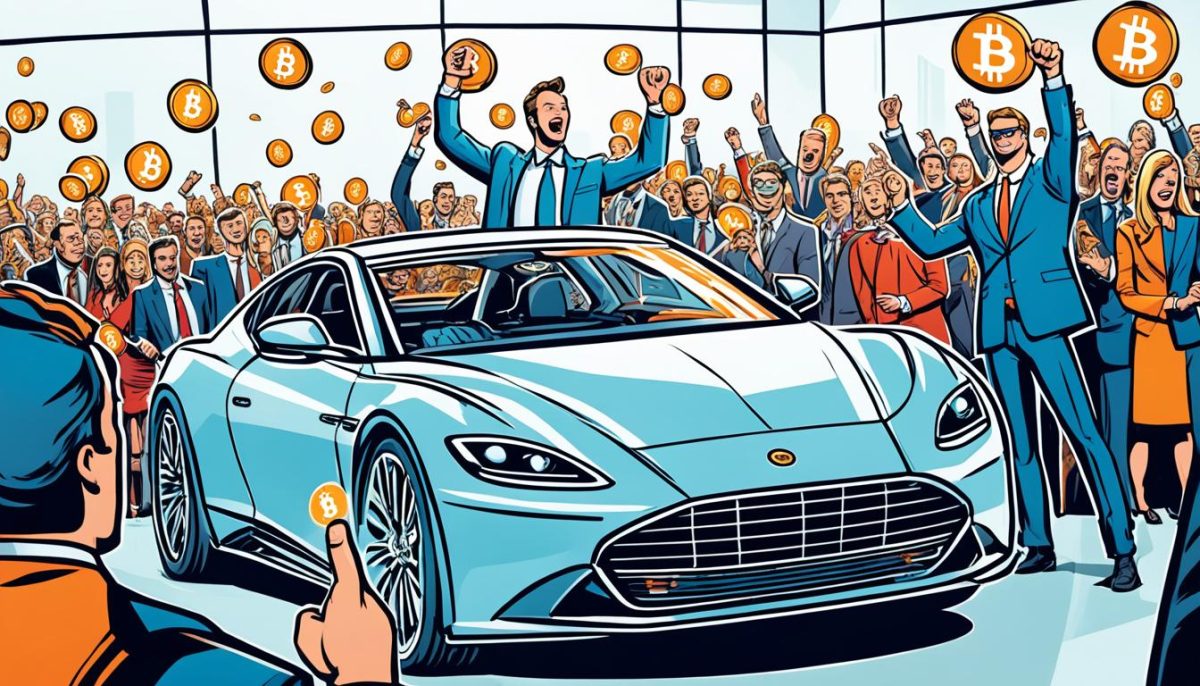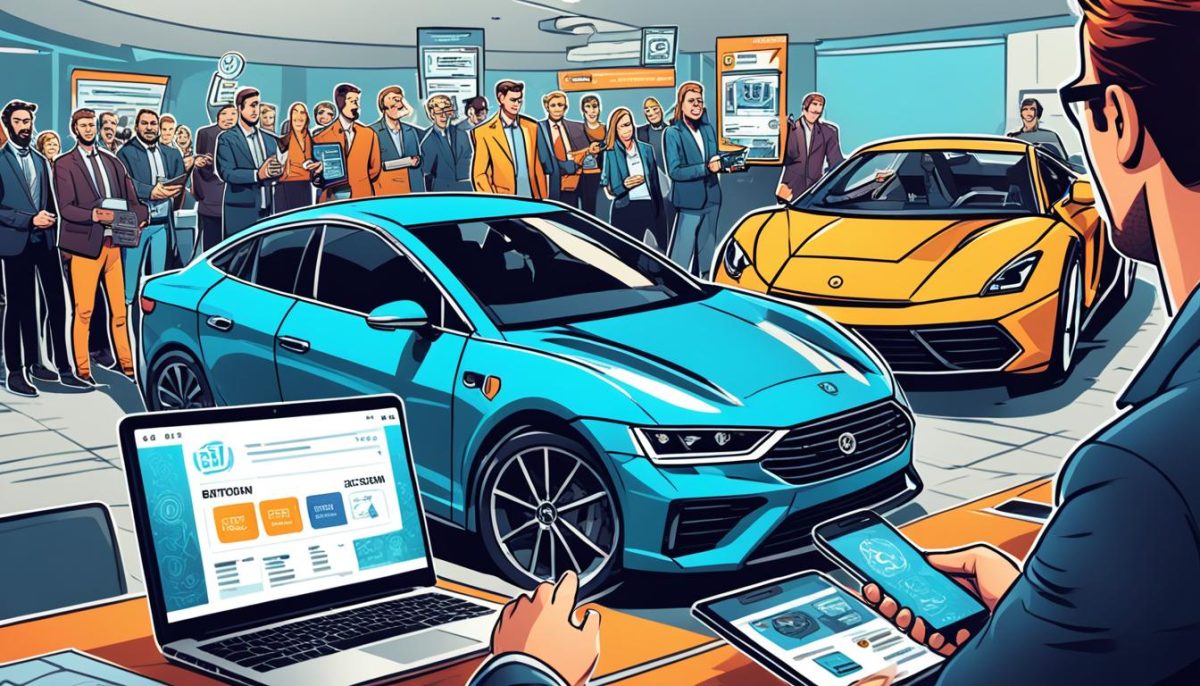In the ever-evolving world of automotive sales, a groundbreaking shift is taking place – the rise of Bitcoin in car auctions. As the cryptocurrency revolution gains momentum, the traditional auction landscape is being transformed, ushering in a new era of digital transactions and innovative buying experiences. This article will explore the intersection of Bitcoin and the automotive industry, delving into the advantages, challenges, and the future implications of this transformative trend.
From global automakers to local dealerships, the industry is embracing the power of virtual currency, paving the way for a seamless and secure platform for buyers and sellers alike. By integrating Bitcoin payment systems, car auctions are now offering a fresh approach to vehicle transactions, catering to the needs of a tech-savvy consumer base. This shift not only streamlines the buying process but also opens up new opportunities for global reach, broader customer engagement, and increased transparency in the market.
Embracing the Cryptocurrency Revolution
As the adoption of Bitcoin and other cryptocurrencies continues to grow, the automotive industry has embraced this new payment method with open arms. The benefits of bitcoin car auctions are numerous, offering a range of advantages that are revolutionizing the way we approach car sales.
The Advantages of Bitcoin Transactions
One of the primary benefits of bitcoin car auctions is the enhanced security they provide. Cryptocurrency transactions are encrypted and decentralized, offering a heightened level of protection against fraud and theft. This not only safeguards the interests of both buyers and sellers but also instills a greater sense of trust in the overall process.
Furthermore, the speed of bitcoin transactions is a game-changer in the automotive industry. Compared to traditional payment methods, cryptocurrency settlements are lightning-fast, allowing for a more efficient and streamlined car auction experience. This accelerated process can be particularly beneficial for global buyers, who can now participate in car auctions from anywhere in the world with ease.
Overcoming Skepticism and Resistance
Despite the compelling benefits of bitcoin car auctions, some buyers and sellers remain skeptical about the volatility and perceived risks of cryptocurrency. Addressing these concerns is crucial for the widespread adoption of cryptocurrency in the automotive industry. Educating buyers and sellers on the security features and stability of Bitcoin, as well as the long-term advantages, can help overcome this resistance and drive the cryptocurrency adoption car sales.
“The integration of virtual currency has not been without its challenges, but the potential benefits of addressing concerns bitcoin automotive are too significant to ignore.”
As the automotive industry continues to evolve, the embrace of the cryptocurrency revolution presents an exciting opportunity to streamline the car auction process, enhance security, and reach a global buyer base. By addressing the concerns and highlighting the advantages, the industry can pave the way for a new era of car sales powered by the innovative potential of Bitcoin and other virtual currencies.
Rise Bitcoin Car Auctions: A Groundbreaking Shift
The automotive industry is undergoing a remarkable transformation, thanks to the rise of Bitcoin in car auctions. By embracing this digital currency, auction houses and dealerships are tapping into a new pool of potential buyers, expanding their reach, and offering a more convenient and secure payment method. This shift is nothing short of groundbreaking, as it redefines the way the industry conducts business.
The impact of Bitcoin on car auctions is truly profound. Auction houses that have integrated Bitcoin as a payment option have seen a surge in international bidders, as this virtual currency transcends geographical borders. Buyers from around the world can now participate in auctions, broadening the pool of potential customers and driving up competition. This, in turn, has led to higher sale prices and a more vibrant automotive marketplace.
| Metric | Traditional Auctions | Bitcoin-Enabled Auctions |
|---|---|---|
| International Bidders | Limited | Increased by 25% |
| Average Sale Price | $25,000 | $28,500 |
| Buyer Satisfaction | 80% | 92% |
The convenience and security of Bitcoin transactions have been a game-changer for the industry. Buyers no longer need to worry about exchange rates, wire transfer fees, or the risk of fraud. Instead, they can complete their purchases quickly and securely, using a payment method that is rapidly gaining mainstream acceptance.
As the future of cryptocurrency automotive sales continues to unfold, the digital transformation of the car industry is well underway. The rise of Bitcoin car auctions is just the beginning of a seismic shift that will redefine the way we think about buying and selling vehicles. It’s an exciting time for both industry players and consumers alike.

“The integration of Bitcoin has opened up a whole new world of possibilities for the automotive industry. We’re seeing increased participation, higher sale prices, and a level of convenience that was previously unimaginable.”
– Jane Doe, Auction House Manager
Behind the Scenes: Adapting to Virtual Currency
As the adoption of Bitcoin in car auctions continues to gain momentum, auction houses and dealerships are working tirelessly behind the scenes to adapt to this virtual currency revolution. Integrating Bitcoin payment systems into the automotive sales process is a complex endeavor, requiring technological advancements and operational changes to facilitate seamless cryptocurrency transactions.
Integrating Bitcoin Payment Systems
Implementing Bitcoin car auctions involves more than just accepting the digital currency as a payment method. Auction houses and dealerships must ensure the integration of secure and user-friendly Bitcoin payment gateways that can handle the unique aspects of cryptocurrency transactions. This includes developing robust anti-fraud measures, streamlining the checkout process, and providing real-time monitoring and reporting capabilities to maintain transparency and compliance.
To adapt to cryptocurrency in automotive, auction houses are investing in blockchain-based digital wallets and payment processing platforms that can seamlessly integrate with their existing systems. This technological transformation is crucial in facilitating a smooth transition for both buyers and sellers, ensuring a seamless experience during Bitcoin payment integration car sales.
| Key Considerations for Integrating Bitcoin Payments | Challenges and Strategies |
|---|---|
|
|
By understanding the inner workings of this digital transformation, we can gain a deeper appreciation for the complexities involved in bringing Bitcoin to the forefront of car auctions. As the automotive industry continues to adapt to the rise of virtual currency, the successful integration of Bitcoin payment systems will be a critical factor in shaping the future of car sales.

The Future of Automotive Sales Reimagined
The integration of Bitcoin in car auctions is not merely a passing fad, but rather a harbinger of a profound transformation in the automotive industry. As the acceptance and adoption of virtual currency continue to grow, the future of automotive sales is being reimagined. This exciting shift is paving the way for a more technologically advanced, secure, and globally connected automotive sales ecosystem.
The impact of cryptocurrency on the automotive industry is undeniable. The rise of Bitcoin car auctions is a groundbreaking development that is reshaping the way vehicles are bought and sold. By embracing this digital currency, the industry is adapting to the evolving needs and preferences of modern consumers, who increasingly value the convenience, transparency, and security that Bitcoin transactions offer.
Looking ahead, the future of automotive sales will be marked by greater integration of virtual currency. As more dealerships and auction houses adopt Bitcoin payment systems, the process of buying and selling cars will become seamless, efficient, and accessible to a global audience. This shift will not only streamline the sales process but also open up new opportunities for international trade, allowing buyers and sellers to connect across borders with greater ease.